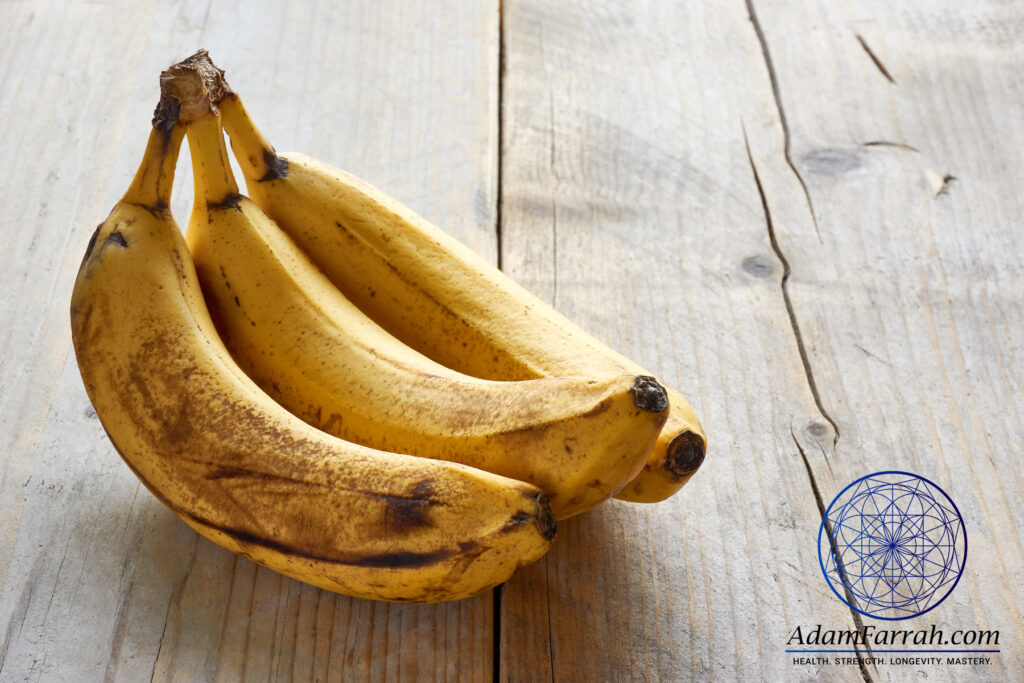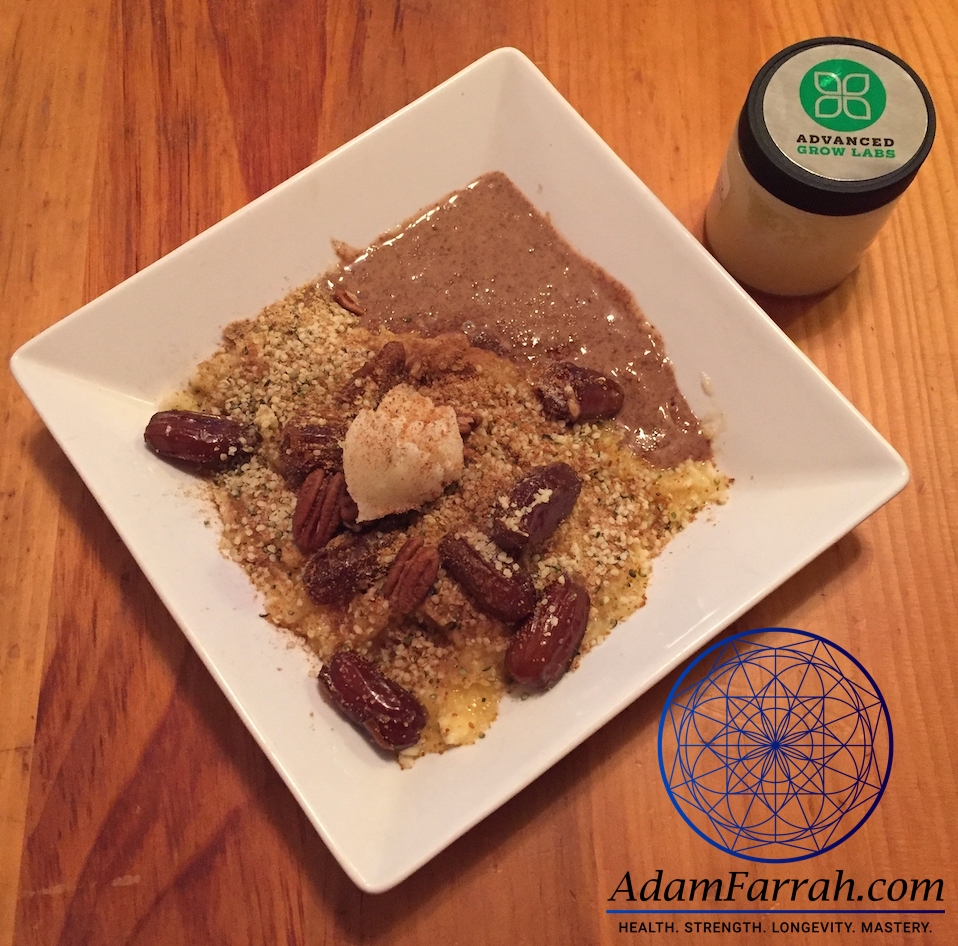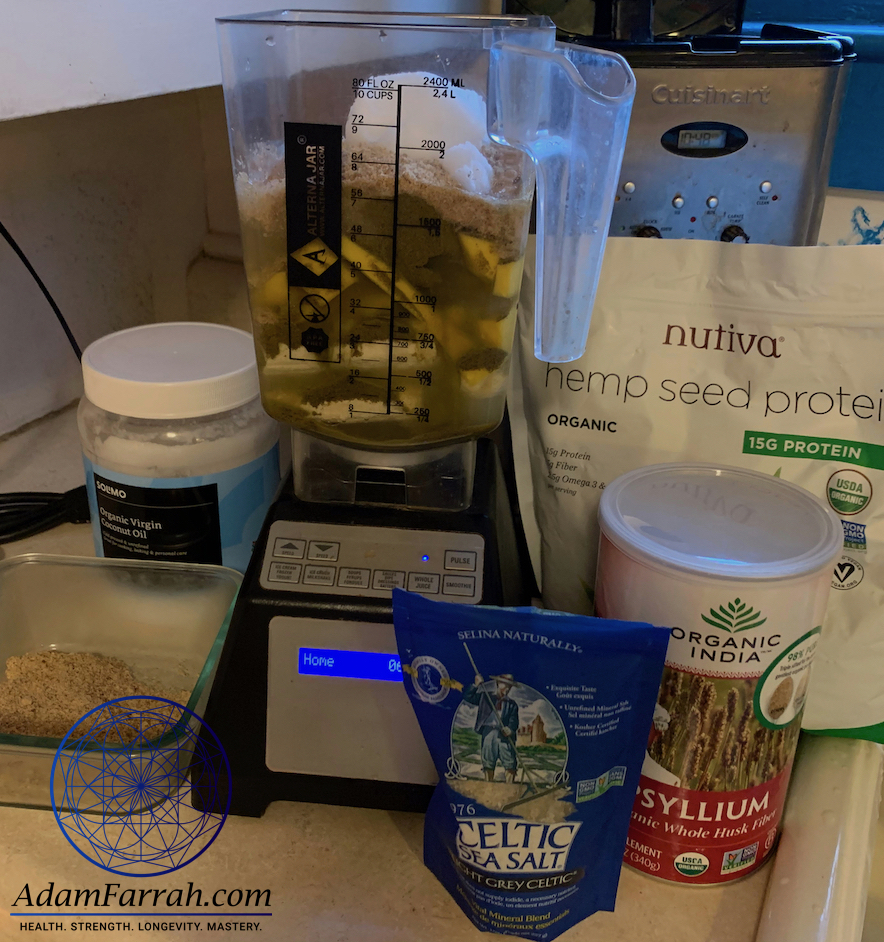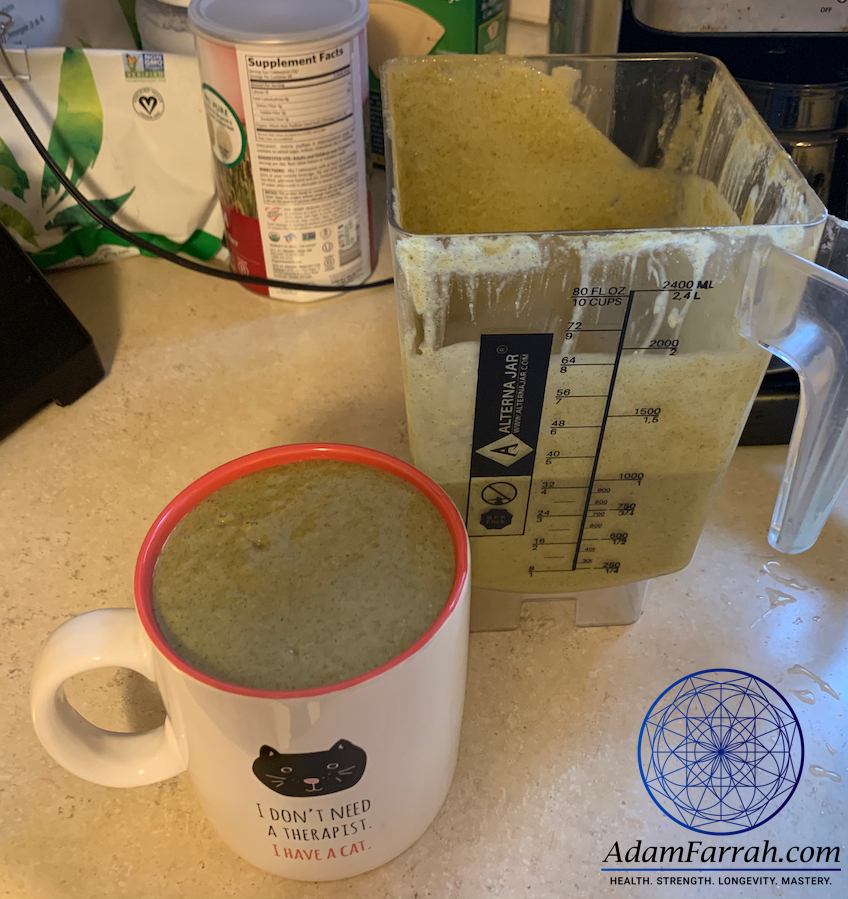
Bananas are a proven food for those with ulcerative colitis.
Starting back in 2004 with my own severe ulcerative colitis diagnosis, bananas have remained a staple in my personal daily diet.
Whether in a flare-up, in remission or completely healed, bananas are a staple food for people with UC.
Today, I suffer virtually no UC symptoms.
Banana-based smoothies have played a major role in my ulcerative colitis healing program over the years. They continue to.
Bananas and Banana-based smoothies are:
- Easy to digest
- Full of fiber
- Gluten-free
- Not immune stimulating
- Allowed on virtually every diet for UC (Though I only recommend Paleo-AIP)
- Cheap
- Easy to find organic
- Easy to find year-round
Keep reading to learn how to incorporate bananas into your own UC healing program.
Bananas are Paleo, Paleo-AIP, Vegetarian, Vegan, Gluten-Free and Specific Carbohydrate Diet Allowed
There are few foods that are pretty much universal between dietary approaches.
There are so many arguments and debates about diets and dietary theories.
But bananas tend to show up in all the major ulcerative colitis diets.
Bananas are included on Paleo, Paleo-AIP, vegetarian, vegan, Specific Carbohydrate Diet and many others.
Bananas Are One of the Few Foods Most Diets Agree On for Ulcerative Colitis
Bananas tend to be pretty universal to dietary approaches and most UC coaches will recommend them as well – regardless of theoretical nutrition bias.
My first introduction to bananas and banana and water smoothies for UC was around 2005 through a raw vegan author and coach. Back in those days, there wasn’t much out there regarding diet and UC. Google searches back then returned very little when I searched diet for ulcerative colitis. (Can you imagine?)
There was raw veganism, Specific Carbohydrate Diet and Weston A. Price. That was about it for diets that outright claimed success with UC. The Paleo Diet was published a few years earlier by Loren Cordain and considered a generally anti-inflammatory diet, but it wasn’t until almost a decade later that it got popular for UC.
I didn’t follow a vegan or raw vegan approach long-term.
But I did learn the value of fruit and water smoothies and still use them as a base for an all-raw vegan smoothie I eat every morning.
Paleo diet theory explains why most fail long term on raw vegan, but there are strong aspects to some of the smoothies and fasting and minimalist eating in raw vegan that are great to understand for people with UC.
What About the Sugar in Bananas and the Paleo Diet?
The whole idea of Paleo being a very low-carb or even ketogenic diet came into the community later on.
Originally, there wasn’t a lot of demonization of carbs and sugar in the Paleo diet world – other than refined and processed carbs and sugar.
Eating a banana or few a day – especially when doing a lot of intense exercise like CrossFit or similar – wasn’t anything anyone got uptight about in the early Paleo days.
My Take on Bananas, Ulcerative Colitis and Paleo
My dietary approach has been Paleo or nearly so since around 2009.
The Paleo world is also where I’ve done the majority of my publishing and speaking.
For ulcerative colitis specifically, I suggest a Paleo-AIP diet and specifically modify it to include ripe bananas as smoothies.
Because ulcerative colitis is such a devastating disease, the possible downside of a lot of fruit and fruit sugars is offset by more pressing problems. For many in the throes of an ulcerative colitis flare-up, ripe bananas as banana and water smoothies are the first nutrition they’ve had in a long time that doesn’t make them sicker and more inflamed.
For people in a flare-up and others sick with UC, the blood sugar spike from bananas is a non-issue, particularly in the short term.
Coconut Oil and Fiber Can Stabilize Blood Sugar
Don’t forget also that the addition of coconut oil to smoothies will lessen the impact of the fruit sugars on blood sugar. Also, the banana fiber and fiber from other fruits or supplements will slow down the blood sugar spike from all the sugars.
Want to learn everything it takes to manage and heal ulcerative colitis and take control of your life back?
Download a free copy of my guide The Illustrated Roadmap for Healing Ulcerative Colitis Naturally!

The Sugar In Bananas Isn’t a Big Deal Relative to Ulcerative Colitis
The sugar and possible insulin spike from eating a lot of bananas isn’t such a big deal.
At least not relative to ulcerative colitis.
This is what I mean about the dietary hair-splitting that goes on. Particularly online now.
When you’re shitting blood 20 times a day, the easily digested and non-irritating nutrition you can get from bananas and water in a blender is truly lifesaving.
In less-severe UC cases, banana and water smoothies with a little coconut oil are an easy-to-digest starting point to build a more expanded daily smoothie off of.
Either way, the ease of digestion and autoimmune neutrality of bananas far offsets the potential health issues of high fruit sugar. Especially in the short-term.
Easily Absorbed Nutrition is More Important than Blood Sugar with UC
Again, for some of us who come from a background with severe UC, a blood sugar spike or wacky macronutrient ratios in the short-term aren’t of high concern.
The major issue with severe UC is to do something to counteract the severe malnutrition that’s building up.
In the early days at my worst with severe UC, my hair was falling out and I weighed about 120lbs. The last thing I was worrying about was a blood sugar spike from bananas or not hitting perfect macronutrient ratios.
Don’t forget, while I don’t recommend it, some people eat an 80/10/10 diet for a very long time. Getting 80% or more of daily calories from raw fruit is something some people do.
They tend not to last on it, but it’s proof you can eat like that for a while without adverse effects.
Again, with UC the main thing is not stimulating the immune system and getting some nutrition that won’t fire out the other end in 3 hours.
Temporary blood sugar spikes and a lot of fruit sugar in the short term is not a big concern with ulcerative colitis and with UC flare-ups in particular.
The Fiber in Bananas is Easier on the Gut than Psyllium Husks in the Beginning
As I explain in detail below, I generally suggest holding off on psyllium husk fiber to start with and only adding it slowly and carefully once somewhat healed (no visible blood).
But the easily digested and gentle fiber in blended bananas is a great way to get some kind of fiber into the digestive tract when struggling with UC. The fiber in bananas is much gentler than psyllium husk. Especially after going through the blender.
What About Sugar Feeding Bad Gut Bacteria and Candida?
I’ve really never found this to be a problem over all these years. If too much fruit was damaging to the gut microbiome or fed candida I’d know it by now. I don’t even use a probiotic supplement regularly. Just fermented foods like sauerkraut and real pickles.
The only side effects I’ve had from eating a lot of bananas all these years is a significant healing and elimination of UC symptoms. I’m not saying this is all because of bananas, but they’ve only helped and nourished me. The same goes for the vast majority of my clients.
Is Eating a Lot of Bananas Long Term Healthy?
I’ve eaten 3-5 bananas a day for years and years. Even before UC I ate bananas in post-workout smoothies most days.
I’ve eaten several bananas daily for almost two decades now.
There were times I lived on only bananas for months.
The only real issues with bananas long term comes from a Paleo or low-carb argument.
And, as I said, even within Paleo there will be different ideas and attitudes toward a high-carb, tropical fruit.
The bottom line is bananas are a staple for me and I haven’t developed any blood sugar or inflammatory issues.
Bananas are superfood for ulcerative colitis.
Bananas Are Easy On the Immune System
For me, the biggest advantage to bananas for ulcerative colitis is that they don’t stimulate the immune system.
Bananas are pretty neutral relative to the immune system.
This is also the least talked-about or appreciated advantage of bananas for UC, in my opinion.
For an ulcerative colitis flare-up, banana and water smoothies are as close as you can get to fasting without actually fasting. The next step for an unresponsive flare-up is a 24-36 hour fast.
Ripe Bananas Are Easy to Digest

Another huge advantage with ripe bananas is how easily they digest.
A mashed banana, or even just a well-chewed banana, is a pretty safe bet for anyone with ulcerative colitis.

I take it even further and generally only have fruit as a smoothie. I still can’t digest a lot of fruit if it’s not blended. I’m not sure who can, truthfully.
Ulcerative colitis or not, most people tell me that smoothies digest easier than whole fruit.
Bananas are Easily Available Year-Round and Cheap
You can find organic bananas just about everywhere. I live in Connecticut and I have zero problems getting bananas here in February.
They’re cheap too. They’ve been under $1 per pound forever. (But I’m sure that will creep up soon.)
Even so, bananas are the cheapest and most plentiful organic fruit you can find.
Keep Bananas in a Variety of Ripening Stages Around
Something I learned the hard way over the years is how to make sure I always have plenty of ripe and edible bananas around.
I consume about 3 medium ripe bananas a day. This means I need to have a pretty steady supply of green and semi-green bananas around, in addition to 6 or 8 ripe ones.
Is there an Ideal Banana Ripeness for Ulcerative Colitis?
There is definitely an ideal ripeness for bananas for ulcerative colitis.
Yellow with brown spots is what we’re looking for.
Why?
The greener the banana, the more starch there is in it. Starch is just a chain of individual sugar molecules.
As the banana ripens, the starch gets broken down into more easily digestible fruit sugars like fructose and glucose.
This makes the bananas much easier to digest for people with compromised digestion and UC.
It’s like the banana is digesting itself as it ripens.
The natural enzymatic ripening process is giving your beleaguered gut a hand by predigesting the starches and breaking them down to sugars.
It’s also why there’s demonization of bananas in some circles – the sugar and the supposed accompanying blood sugar spike.
Bananas as Fruit Smoothies for Ulcerative Colitis

The best thing a person with UC can do is learn how to make smoothies.
You can influence and improve your stool quality with expert use of smoothies. All it takes is some patience and experimentation.
I consider bananas and water to be the universal smoothie base. That’s where I start for every smoothie I make.
Advantages of Banana Based Smoothies for Ulcerative Colitis
Banana and water smoothies – and fruit smoothies in general – offer significant advantages over whole fruits for people with ulcerative colitis.
Advantages of banana smoothies for UC:
- Pre-chewed mechanically and partially liquified
- Full of fiber
- Hydrating
- Full of vitamins and electrolytes
- Perfect medium for protein powders and supplements
- Perfect deliver method for psyllium husk fiber
My first meal of the day is always a fruit smoothie and the base is always bananas and water.
(Keep reading for my personal smoothie recipe in detail!)
Banana and Water Smoothies – The Ulcerative Colitis Flare-Up Fix
The very first thing I start a client with a flare-up on is just simple banana and water smoothies.
Banana and water smoothies are the fastest and easiest way to get nutrition into the body during a flare-up without triggering the immune system further.
If you’re in a flare-up right now read Healing Ulcerative Colitis Flare-Ups for everything you need to know about shutting down and healing a UC flare-up.
My Personal Banana-Based Smoothie for Ulcerative Colitis

This particular smoothie recipe has been a daily staple for me for many years now:
- Nutiva Hemp Protein Powder
- Fresh bananas
- Fresh fruit like mangoes, strawberries or blueberries
- Organic coconut oil
- Organic India Psyllium Husk Fiber
- Ground Flax Seeds
- Celtic Sea Salt
- Water
This combination of “stuff” blended together is about as close as I’ve found to foods that are actively healing for the gut and UC.
This shake daily makes a HUGE difference in my bowel health and stools.
I’ve been told the same thing by others – with and without UC – who have used the recipe with consistency as well.
A Caveat on the Psyllium Husk Fiber
If you’re not well-healed or are in a flare-up, the psyllium husk fiber will likely be too much for you. Don’t use that ingredient until you’re more healed and your digestive tract is more robust.
A Caveat on the Ground Flax Seeds
This one is kind of a “rule bend.” Flax seeds are not allowed on a strictly Paleo-AIP eating template.
I’ve personally been using them forever and my immune system is fine with them. I feel the additional fiber is quite beneficial for me.
But I’ve tested this in my own body extensively. This is an empirical thing.
Not everyone can handle them. I’ve seen others who react to flax seeds.
What About Frozen Fruit and UC?
I generally don’t recommend frozen fruit unless it’s thawed first. The cold fruit in the shake compromises digestion and forces the body to warm the food to body temperature to digest it.
With ulcerative colitis digestion is already compromised and weak. Adding frozen bananas to a shake makes it harder to digest and can even cause digestive discomfort in individuals with UC.
I don’t recommend using very cold fruit in shakes. Keep them room temperature.
Conclusion
Bananas are a universal superfood for ulcerative colitis.
Whether in a flare-up or far along the healing path, bananas and banana-based smoothies deliver results as a staple food for ulcerative colitis.
I’ve spent over a decade healing UC myself and helping others to manage and heal their own issues with ulcerative colitis.
I’ve found no other food that’s as universal, easy to digest, easy to find or as neutral to the immune system as bananas.
Bananas and banana-based smoothies are a foundational component of any diet for ulcerative colitis.
Since my own severe ulcerative colitis diagnosis in 2004, bananas and banana-based smoothies have been a daily staple for me.
Bananas are exceptional food for ulcerative colitis no matter what stage of healing you’re in.
Bananas truly are superfood for ulcerative colitis.
Have you experienced the value of bananas in an ulcerative colitis healing diet? Have you tried them as a result of this post? Leave a comment and let me know!
Hey Adam,
thank you for this post. I would like to give the smoothie a try, but I’m not sure about the hemp protein powder. Isn’t the powder made from hemp seeds? Because seeds are generally not included in AIP. Or am I missing something?
Kind regards,
Tobi
Hey Tobi,
Thanks for the question. You are correct about the hemp protein being from seeds and, technically, being excluded on a Paleo-AIP eating plan.
If you’re in a flare-up, I DO NOT recommend hemp protein or psyllium husk fiber or ground flax seeds.
If you’re relatively well-healed and under control though, hemp protein is a much better option over the other protein powders available like whey, casein, pea, brown rice, etc.
All the above powders will be very autoimmune stimulating and will cause or exacerbate a flare-up.
I eat seeds daily – hemp protein powder, ground flax seeds and psyllium husk fiber.
Seeds I’ve done well on for years. I haven’t had a flare-up in over a decade.
But I am very, very well-healed.
If you’re relatively under control and healed, I’d suggest doing bananas and water ONLY first. Then bananas, water and coconut oil for a few days. Then move into bananas, water, coconut oil and ONE Tablespoon of the hemp protein and nothing else.
Do that a few days and see what happens.
If you’re in a flare-up though, stay away from introducing a new food, especially a seed-based product like hemp.
Good luck and let me know how it goes.
Adam
Hey Adam,
thanks alot for your elaboration. Fortunately I am (still) a relatively mild UC case, but there is still some blood in my stool so I suppose introducing the hemp powder might be a little too soon. But if I can resolve the blood somehow I might try to introduce this one. Banana and coconut oil sounds good aswell for starters!
Thank you.
Tobi